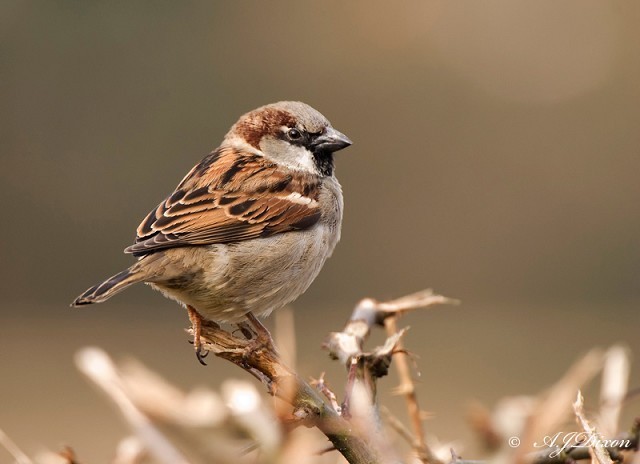Cats kill an estimated 55 million birds in Britain every year and such predation could be contributing to long-term declines of garden birds like House Sparrows. To help bird- and cat-lovers to reduce the impact of cats on garden birds, the British Trust for Ornithology (BTO) has produced a free guide.

House Sparrow, Reddish Vale CP, Greater Manchester (Photo: Anthony Dixon)
No householder likes to see it: a pile of feathers on the lawn or a dead bird dropped neatly at the foot of the bed. Historically, predation of birds by cats was not considered a big issue — indeed, in the 19th century it was thought that without cats some urban areas might be overrun by House Sparrows! However, the huge number of birds that are taken by cats annually could contribute to the long-term decline of species like House Sparrow. Because of their ground-feeding behaviour, other familiar garden birds, such as Robin and Dunnock, may also suffer from the activities of our cats.
The BTO has produced a guide that outlines practical steps that householders can take to minimise the impact of cats on garden birds. For example, householders can spread out bird feeders so that feeding flocks might spot a cat more easily. Chicken wire of a suitable gauge can be placed around nest boxes and thorny vegetation (e.g. pyracanytha) can be planted to help protect nesting birds. In addition, sonic devices that are triggered when a cat crosses in front of them can help dissuade cats from using certain areas of a garden (e.g. around bird feeders). Bells fitted to cat collars might also give birds an early warning that a cat is present.
Dr Tim Harrison of BTO Garden BirdWatch commented "Gardens contain important breeding populations of Red-listed species such as Starling, Song Thrush and Spotted Flycatcher. With around nine million cats in the UK and only 59,000 pairs of Spotted Flycatchers, it is easy to see why some people are concerned about cat predation."

Spotted Flycatcher, Saumarez Park, Guernsey (Photo: Chris Bale)
He added, "Public affection for both cats and garden birds is enormous, so the key is to minimise the impact of cats on birds while accommodating both. Nestling and fledgling birds are especially vulnerable to predation by cats, so now is a great time to be thinking about how we can help."
For a free BTO guide on cats and garden birds or for more information about BTO Garden BirdWatch telephone 01842 750050, email gbw@bto.org or write to GBW Cat Guide, BTO, The Nunnery, Thetford, Norfolk, IP24 2PU.Key References
Baker et al. (2005). Mammal Review www3.interscience.wiley.com/journal/118653850/abstract
Baker et al. (2008). Ibis www3.interscience.wiley.com/journal/121384184/abstract
Woods et al. (2003). Mammal Review www.abdn.ac.uk/~nhi775/cat_predation.htm


